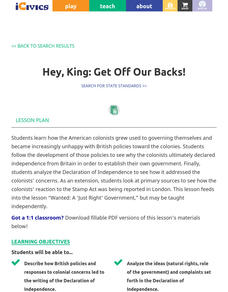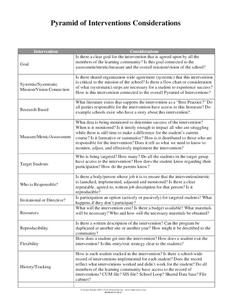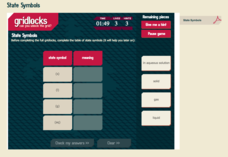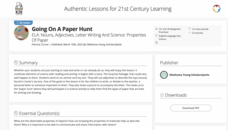University of North Florida
Family Child Care Home Instructional Unit: My Community
As Mister Rogers would say, "It's a beautiful day in this neighborhood," especially when youngsters know all about community helpers and their role in the community. These two units, one designed for ages two to three and the other...
iCivics
Hey, King: Get Off Our Backs!
Young historians explore the reason American colonists were unhappy under British rule. Class members complete hands-on activities and participate in a group discussions to understand why colonists drafted the Declaration of Independence.
Florida Center for Reading Research
Phonics: High Frequency Words, Sand Paper Words
Learners use a stack of words embellished with tactile elements, such as sandpaper, to practice high-frequency words. Pupils trace the tactile surface of each letter in the word, write it on their paper, then find and glue that word from...
All Things PLC
Pyramid of Interventions Considerations
There's much to consider when contemplating an intervention for students. Here's a list of considerations that should be taken into account, as well as questions that should be asked and answered during the planning stage.
Royal Society of Chemistry
Testing for Gases
If most gases are invisible, how do we know so much about them? Pupils practice associating the name, formula, testing method, and outcome for four common gases using an interactive. Users build on the content of their first puzzles to...
American Museum of Natural History
Being an Archeologist: Chuck Spencer
Meet Chuck Spencer, an archeologist who studies the Zapotec people who lived in the Valley of Oaxaca, Mexico over 2000 years ago. Spencer shares in print his response to questions posed by kids.
Scholastic
Hopes and Dreams
A lesson encourages mini scholars in setting goals. Peers share their hopes and dreams and discuss how each one adds to everyone's unique character. Class members draw themselves in a scene achieving a goal. A follow-up meeting allows...
Channel Islands Film
First Contact: Lesson Plan 4 - Grades 5-6
After watching Treasure in the Sea, a documentary about Channel Islands National Park and the video First Contact, about the voyage of Juan Rodríguez Cabrillo to the Channel islands, groups research and then compare the...
Smithsonian Institution
African American Pioneers in Aviation
Bessie Coleman. William Powell. Willa Brown. Benjamin O. Davis, Jr. While these names may not be familiar to many Americans, they are African American pioneers in aviation history. Class members have an opportunity to research the...
NOAA
Ocean Waves
Surf's up! What causes the constant motion of Earth's oceans? Scholars discover the origins and types of waves in part nine of a 13-installment series. The resource illustrates wave behavior, their destructive power, and current research...
Royal Society of Chemistry
Alkalis and Salts
Gamification is an educational sensation! Young scientists build their acid-base vocabulary skills through a series of puzzles focused on bases and the salts they form. The challenging activity comes complete with a printable version and...
Royal Society of Chemistry
Isomers of (E)-but-2-ene
One chemical formula—but how many different structures? Familiarize young chemists with the concept of isomers through simple, related games. Users identify each isomer base upon its name, structure, and type of isomerization in a set of...
Royal Society of Chemistry
Gas Laws: Converting Units
Given a choice between playing a game or completing a worksheet, which do you think your class would choose? Tap into their reasoning skills with a series of puzzles focused on gas laws unit conversion. You can use the resource online or...
Royal Society of Chemistry
State Symbols
When water is a solvent in a chemical equation, we consider it an aqueous solution. Scholars match the name of four states of matter to their proper symbol in a chemical equation. Four puzzles provide repetition to help pupils remember...
American Museum of Natural History
Being a Zoologist: Sandra Olsen
Are your students wild about horses? Then introduce them Sandra Olsen, a zooarchaeologist, who has been studying horses and the people who herd them. Ms Olsen responds to 15 interview questions and details how she goes about her...
K20 LEARN
Going on a Paper Hunt: Nouns, Adjectives, Letter Writing and Science - Properties of Paper
A lesson introduces scholars to nouns and adjectives. After listening to a short story and practicing creating adjectives with a card sort, pupils go on a paper hunt to locate different types of paper, complete a chart with adjectives,...
K20 LEARN
Let's Mail Away!: Writing Letters
Scholars watch a video or listen to a story about writing letters, then discuss their importance. A scavenger hunt challenges them to identify common elements of friendly letters and create an anchor chart. Pupils write letters to a...
National Endowment for the Humanities
Lesson 1: The United States Confronts Great Britain, 1793–1796
After the Revolutionary War, the success of the United States was far from guaranteed. Foreign powers coveted the new land, and Great Britain challenged American sovereignty. Learners consider the challenges facing the new nation using...
K20 LEARN
Building To 100: Building And Decomposing Numbers
Following a catchy video about decomposing numbers, young mathematicians build and write numbers using dice. Class members work to create an anchor chart that displays six ways to make numbers. Beans get scooped and estimated, then...
Curated OER
Online Spanish Lesson on Superlatives: General Rules
How much does your class know about superlatives? Inform them of the basics and provide some practice with the information here. You can use the examples to help teach the concepts in class or send learners to this page at home. The...
Curated OER
Mesopotamia: The Worksheet
Read to learn! Middle Schoolers read a short passage on Mesopotamia then answer seven comprehension questions. This would be ideal as homework or for early finishers.
Curated OER
New Vocabulary: The Ugly Duckling
The class hears the story of The Ugly Duckling to build vocabulary. They hear the story, then pull three to four vocabulary words from the text. The teacher then helps them use the context of each sentence to construct a meaning for each...
English Linx
Points of View Worksheet
Scholars need to learn as early as possible the different types of point of view, because one cannot speak in the second person for his entire life—it would be very rude. This covers first, second, and third person. The examples are...
Curated OER
Obstacles to Perseverance
What does it mean to persevere. Young historians review the definition of perseverance then brainstorm a list of obstacles colonists and revolutionaries had to overcome during the American Revolution. Using this list, they identify...























